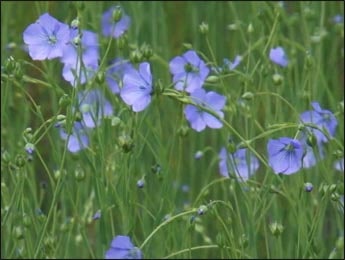
What is Linseed?
Linseed is a perennial herb which is used both externally as well as orally in Ayurvedic system of medicine and grows up to 1.2 m tall, with slender stems. Its leaves are 20-40mm long and 3mm broad, slender lanceolate and glaucous green. Flowers are 15-25mm in diameter, with five petals and are pure pale blue in color. Seeds are 4 to 7 mm long, glossy brown in color and are rich in omega-3 fatty acids, fiber, and lignans. It also contains fatty acids that are beneficial for good health. Its botanical name is Linum usitatissimum and it belongs to family Linaceae.
Habitat: It is native to India, China, Canada, US, and other countries.
Part used: Flower, seed, and oil
Names in different languages:
- English name: Flaxseed or Linseed
- Hindi name: Tisi, Alasi
- Punjabi name: Ali
- Urdu name: Katan, Alsi
- Unani name: Kattan
- Malayalam name: Agasi, Agastha
- Assamese name: Tusi, Tisi
- Marathi name: Jawas, Atshi
- Gujarathi name: arasi, Alhsi
- Tamil name: Ali, Virai, Aalisidirai
- French name: Tukhme kattan, Jagira
- Bengali name: Atasi, Masina
- Marwadi name: Alasi
- Oriya name: Atushi
Sanskrit Synonyms:
- Kshaumi, Rudrapatni
- Uma, Survarchala
- Kshama, Parvati
- Neela pushpin, neela
What are the Medicinal Properties of linseed?
- Rasa (Taste): Tikta (Bitter)
- Guna (Qualities): Guru (heaviness), Picchila (Sticky)
- Veerya (Potency): Ushna (Hot)
- Vipaka: Katu (It undergoes pungent taste after digestion)
- Karma (Actions): It balances Vata dosha and increases pitta and Kapha dosha.
What are the Medicinal Uses of Linseed?
- Linseed is useful in treating cough and other respiratory diseases.
- This herb helps in treating urinary disorders and intestinal problems.
- It reduces inflammation, sore throat.
- It provides relief in various skin conditions.
- It also treats constipation and gastritis.
What are the Therapeutic Uses of Linseed?
Constipation
Linseed is very effective in constipation by acting as a laxative and lubricant that draws water into the bowel to loosen and soften the stool. It also acts as an anti-inflammatory and analgesic that reduces the pain and burning sensation in the abdomen and rectum. It increases the bowel movements and unblocks the feces from the colon. It stimulates the digestive system and also eliminates the toxins from the body. It also provides relief in other symptoms such as acidity, abdominal pain, flatulence etc.
Cough and respiratory disorders
This herb acts as an expectorant that breaks up the thick mucus and reduces the cough reflex. It also acts as antitussive and bronchodilator that dilates the bronchioles, relaxes the muscles and widens the airways of the lungs. It also provides relief in other symptoms related to respiratory disorders such as sore throat, pain in the chest, headache etc.
Urinary disorders
In urinary disorders, this herb relaxes the muscles of the bladder and increases the urinary flow. It also helps in relieving symptoms of overactive bladder and reduces the episodes of urge incontinence. It also acts as an antibiotic that stops the growth of bacteria. Its diuretic property increases the urine formation which helps the body to get rid of extra salt and water.
Intestinal disorders
Linseed acts as an antacid that inhibits the production of acid in the stomach especially at night and neutralizes it. This herb acts as an antibiotic that stops the growth of microbes in the intestines and removes the intestinal obstruction. It also helps in boosting the absorption of nutrients in the intestine and provides relief in other symptoms such as diarrhea, nausea, vomiting etc.
Hair and skin problems
Linseed acts as an antimicrobial that inhibits the growth of microorganisms, prevent the spread of infection and keeps the skin moist. This herb removes the toxins from the body, prevents hair loss and stimulates the growth of new hairs. It also maintains the blood circulation and nourishes the hair follicles, roots and scalp to make them healthy and strong. It provides relief in other symptoms such as dry skin, itching, graying of hairs etc. It also accelerates the healing of wounds in a shorter period of time.
Different Preparations made by Linseed
- Powder
- Infusion
- Oil
Doses of these Preparations
- Powder: 3-6 gm
- Infusion: 15 ml
